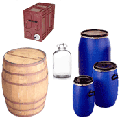Equipment - Storage and Bottling
This is important equipment, and making sure you have good (and clean) equipment will mean that you should be able to keep your hard earned cider for as long as you need to.
There are (as with all things) a vast range of equipment you can choose from. However, there are a few simple rules that you should follow:
- Don’t use anything metal (unless its grade 316 stainless steel).
- If you are using plastic, make sure it is HDPE (High Density Polythene) and as thick as is practicable. Plastic is permeable to air – and if you are using thin plastic, this will eventually oxidise your cider/perry and ruin its flavour.
- Keep things clean and sterile. Many a batch has been spoiled by unwanted bacteria in the container.
- In general terms, your cider should fill the containers as close to the top as possible – to leave as little air in. they should have sealable lids (air tight) and don’t forget that you will probably need to fit an airlock to them (so either go for something with a hole for one, or that can be drilled out to allow an airlock to be fitted).
Find below brief descriptions of the main types of containers used – plastic, wood and stainless steel.
- Food Grade Plastic
Plastic (HDPE) is the popular medium for storing cider these days, the thicker the better if you want to store for any length of time. There is no significant benefit of one colour or another, although some people do favour a darker shade to keep out the light.
The main benefits of using plastic are that it is cheap to obtain, available widely and easy to clean. It doesn’t add any flavour to the cider or perry, so don’t expect any additional ‘oaky’ notes. However, it is reliable and available in many sizes (from 5 litres to an IBC of 1000 litres)
Ex-fruit juice concentrate containers are fine – but not if they previously contained citrus juice (orange, lemon, lime etc.). The oils permeate the plastic, leach into the cider for years, and the taint is impossible to remove.
- Wood
The traditional way of storing cider, wooden barrels will add its own character to a cider and keep it well. Generally larger than plastic tubs, although require more maintenance to keep them water tight. Barrels are also More expensive to buy than food grade plastic and harder to thoroughly clean.
Rather than being sized by litres, wooden barrels can be found as: Rundlet (15 gal/68l), barrel (26 gal/119l), tierce (35 gal/159l), hogshead (52.5 gal/239l), firkin/puncheon/tertian (70 gal/318l), pipe/butt (105 gal/477l) and tun (210 gal/955l). Of course, a visit to a number of cider makers will demonstrate that wooden barrels can come in much larger sizes than these! Oh, and just to confuse you, these names/sizes are different in the USA.
- Stainless steel
Favoured as a clean alternative to wood, stainless steel also has an extremely long life and can come in very large sizes. Stainless steel is a more commercial medium to use than plastic, whilst being more reliable than wood.
- Glass
Glass is the most common material for storing small quantities, although it is breakable and comparatively expensive. Care must be taken when bottling cider or perry that either it is fully fermented (i.e. not going to start fermenting and explode the bottle) or that the bottle is strong (champagne bottles). Even then, the SG of the drink should be below 1010.
Bottles will require either a crown cap, cork or screw cap to be fitted in order to seal them. This can be done cheaply, although normally requires a small tool for fitting the top/cap.
Larger glass containers, such as glass carbouys, will store more - although again these are expensive and cumbersome once filled.
Having said all this, the strongest pro for glass bottle storage (apart from the portable nature of storing small quantities) is that it does not allow oxygen to diffuse into the cider. As long as the bottle is stored properly (in a cool place, on its side if it has a cork etc.) the drink should be good for a long time.
- Bag in Boxes
A more recent addition to the range of storage options for the cider/perry maker, a bag in box (or manacube) is a collapsible laminated plastic container within a box - much the same idea as boxes of wine. Being plastic, the shelf life for BinB's is far less than glass, depending on the quality of the laminate - some recommend no more than 3 months.

| There are many places that you can buy containers from. Below are just a few of the more popular stores: |
If you can recommend any others, please let us know. |

